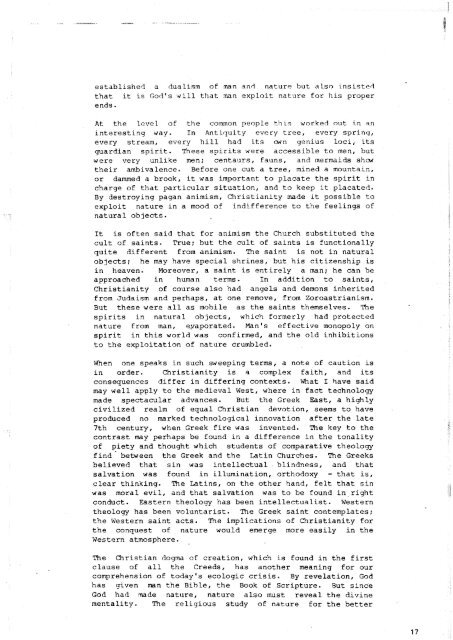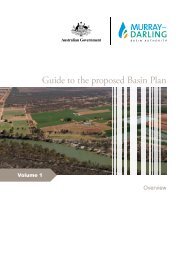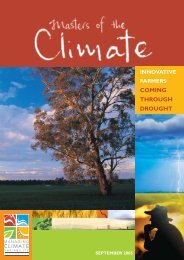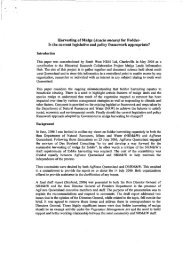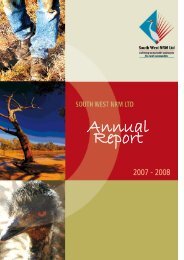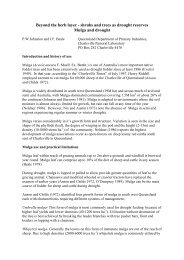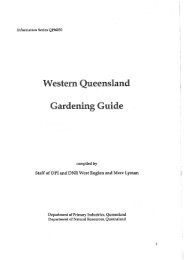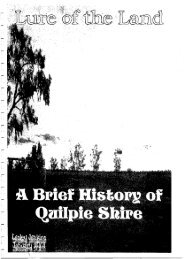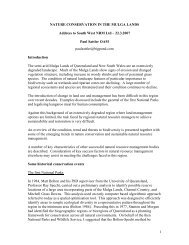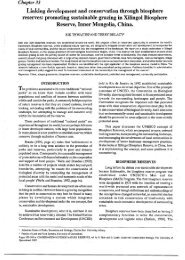soil-conservation-people-religion-and-land.pdf - South West NRM
soil-conservation-people-religion-and-land.pdf - South West NRM
soil-conservation-people-religion-and-land.pdf - South West NRM
Create successful ePaper yourself
Turn your PDF publications into a flip-book with our unique Google optimized e-Paper software.
established a dualism of man <strong>and</strong> nature but also insisted<br />
that it is God's will that man exploit nature for his proper<br />
ends.<br />
At the level of the common <strong>people</strong> khic, worked out in an<br />
interesting way. In Antiquity every tree, every spriny,<br />
every stream, every hill had its mn genius loci, its<br />
guardian spirit. These spirits were accessible to men, but<br />
were very unlike men; centaurs, fauns, <strong>and</strong> mermaids shm<br />
their ambivalence. Before one cut a tree, mined a mountain,<br />
or dammed a brook, it was important to placate the spirit in<br />
charge of that particular situation, <strong>and</strong> to keep it placated.<br />
By destroying pagan animism, Christianity made it possible to<br />
exploit nature in a mood of indifference to the feelings of<br />
natural objects.<br />
It is often said that for animism the Church substituted the<br />
cult of saints. True; but the cult of saints is functionally<br />
quite different from animism. The saint is not in natural<br />
objects; he may have special shrines, but his citizenship is<br />
in heaven. Moreover, a saint is entirely a man; he can be<br />
approached in human terms. In addition to saints,<br />
Christianity of course also had angels <strong>and</strong> demons inherited<br />
from Judaism <strong>and</strong> perhaps, at one remove, from Zoroastrianism.<br />
But these were all as mobile as the saints themselves. The<br />
spirits in natural objects, which formerly had protected<br />
nature from man, eyaporated. Man's effective monopoly on<br />
spirit in this world was confirmed, <strong>and</strong> the old inhibitions<br />
to the exploitation of nature crumbled.<br />
When one speaks in such sweeping terms, a note of caution is<br />
in order. Christianity is a complex faith, <strong>and</strong> its<br />
consequences differ in differing contexts. What I have said<br />
may well apply to the medieval <strong>West</strong>, where in fact technology<br />
made spectacular advances. But the Greek East, a highly<br />
civilized realm of equal Christian devotion, seems to have .<br />
produced no marked technological innovation after the late<br />
7th century, when Greek fire was invented. The key to the<br />
contrast may perhaps be found in a difference in the tonality<br />
of piety <strong>and</strong> thought which students of comparative theology<br />
find between the Greek <strong>and</strong> the Latin Churches. The Greeks<br />
believed that sin was intellectual. blindness, <strong>and</strong> that<br />
salvation was found in illumination, orthodoxy - that is,<br />
clear thinking. The Latins, on the other h<strong>and</strong>, felt that sin<br />
was moral evil, <strong>and</strong> that salvation was to be found insright<br />
conduct. Eastern theology has been intellectualist. <strong>West</strong>ern<br />
theology has been voluntarist. The Greek saint contemplates;<br />
the <strong>West</strong>ern saint acts. The implications of Christianity for<br />
the conquest of nature would emerge more easily in the<br />
<strong>West</strong>ern atmosphere.<br />
The Christian dogma of creation, which is found in the first<br />
clause of all the Creeds, has another meaning for our<br />
comprehension of today's ecologic crisis. By revelation, God<br />
has given man the Bible, the Book of Scripture. But since<br />
God had made nature, nature also must reveal the divine<br />
mentality. The religious study of nature for the better


